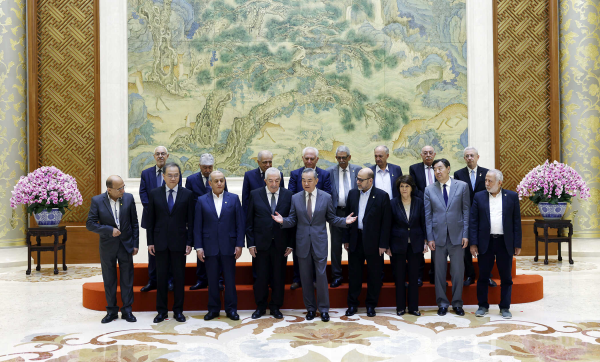
- The core outcome of the Beijing talks is the recognition of the Palestine Liberation Organization (PLO) as the only legitimate representative of the Palestinian people.
- Wang Yi emphasised that the Palestinian groups can only succeed in their national liberation fight when they unite and march forward together, and only when they speak with one voice and demand justice.
- The strongest call is for the actual establishment of an independent State of Palestine in accordance with pertinent U.N. resolutions.
Member of the CPC Central Committee’s Political Bureau and Minister of Foreign Affairs Wang Yi attended the signing of the Beijing Declaration on Ending Division and Strengthening Palestinian National Unity by 14 Palestinian factions on July 23, 2024, during the closing ceremony of the reconciliation talks in Beijing.
Wang Yi stated in his speech that President Xi Jinping has made suggestions and declarations for the resolution of the Palestinian issue since the dawn of the new era, offering Chinese wisdom and a solution to the problem. Currently, Beijing is the hub for 14 Palestinian factions coming together for the sake of their country. In the history of the Palestinian liberation movement, this is a significant turning point. China congratulates all the parties on the success of the Beijing conversation and the signing of the Beijing Declaration, and it praises their efforts at reconciliation.
Wang Yi emphasised that the Palestinian groups can only succeed in their national liberation fight when they unite and march forward together, and only when they speak with one voice and demand justice. The core outcome of the Beijing talks is the recognition of the Palestine Liberation Organization (PLO) as the only legitimate representative of the Palestinian people. The agreement to establish an interim government of national reconciliation with a focus on the reconstruction of Gaza after the conflict is the biggest highlight. The strongest call is for the actual establishment of an independent State of Palestine in accordance with pertinent U.N. resolutions. The main consensus from the talks is to achieve reconciliation and unity among the 14 factions. Building confidence, staying on course, and making small steps forward are essential to the Palestinian reconciliation effort. The reconciliation process will only result in increasing unity and meaningful development if constant efforts are made to forge consensus and put it into action. The Palestinian factions’ internal affairs are their own concern, and reconciliation is impossible without outside assistance. China and the Arab and Islamic countries are travelling in the same direction towards rapprochement.
The first step is to guarantee access to humanitarian supplies and rescue on the ground while working towards a comprehensive, long-lasting, and sustainable ceasefire in the Gaza Strip as soon as feasible. To put a stop to hostilities and achieve a ceasefire, the international community needs to work together more.
Putting up coordinated efforts to establish a post-conflict government in Gaza based on the idea that “Palestinians governing Palestine” is the second phase. An essential and inseparable component of Palestine is Gaza. Commencing post-conflict reconstruction promptly is of utmost importance. For Gaza and the West Bank to be effectively managed and for an interim national consensus administration to be established, the international community must assist Palestinian groups.
Assisting Palestine to join the United Nations as a full member and begin putting the two-state solution into practice is the third step. To provide a timeline and roadmap for the two-state solution, it is critical to advocate for the holding of an international peace conference that is more inclusive, powerful, and productive.
Priorities include humanitarian relief efforts and a ceasefire. “Palestinians governing Palestine” is the fundamental tenet underlying Gaza’s post-conflict administration. The essential path forward is the two-state solution. The parties should get genuine assistance from the international community in completing the three tasks.
Diplomatic envoys to China or their representatives from Egypt, Algeria, Saudi Arabia, Qatar, Jordan, Syria, Lebanon, Russia and Türkiye as well as representatives from 14 main Palestinian factions attended the closing ceremony.
Prajwal K M holds a Master’s in Diplomacy, Law, and Business with a specialization in Economics and Foreign Policy. He is currently a consultant at the Nation First Policy Research Centre (NFPRC), a Delhi-based think tank working on policy design and implementation with the government. Formerly Deputy Editor at SamvadaWorld, his work focuses on the political and economic landscapes of West Asia and North Africa.
